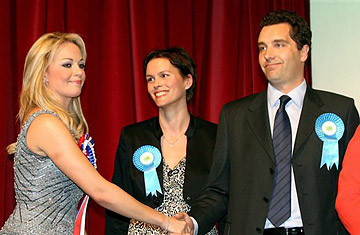
Conservative candidate Edward Timpson, right, is congratulated by former Miss Great Britain and Independent candidate Gemma Garrett after a special election in Nantwich, UK
Britain's beleaguered Prime Minister Gordon Brown and his increasingly panicky Labour Party might have thought they bottomed out earlier this month, when the party lost the London mayoralty and suffered its most disastrous municipal election result across the country in decades. But yesterday it got even worse. The resurgent Conservatives stomped to victory in a by-election in Crewe, a working-class town in northwestern England that has been an unsinkable Labour bastion since World War II. The sheer size of the victory — 17.6% of the electorate switched from Labour to Tory since the last election in 2005 — was sufficient cause to pass over the policy missteps and campaign gaffes that contributed to the debacle and go straight to the jugular concern of British politics these days: how long can Gordon Brown survive?
Not long, hopes Tory Leader David Cameron, who traveled four times to the Crewe constituency in the course of the short campaign triggered by the death of a long-time Labour stalwart, Gwyneth Dunwoody. Cameron praised the win of his party colleague, Edward Timpson, as evidence that Britain wants an end to "big, top-down, bossy, interfering government."
But with no British general election mandated for two more years, Cameron has little say about whether it's time for Brown to go. The Prime Minister's more immediate threat is from restless Labourites keen to vault the party out of the hapless political rut it has inhabited since Brown decided not to call snap elections last fall.
The defeat has further spurred ample speculation in the British press about a leadership challenge to Brown from ambitious Labourites. Any open challenge would likely come first as trial balloons from backbench "stalking horse" candidates, who could never win. But if the bidding were open, more prominent party figures, many of whom now argue passionately for unity behind Brown, could enter the ring. Among the names mentioned are David Milliband, the baby-faced but brilliant Foreign Secretary; Ed Balls, the Education Secretary, who was a key Brown operative in the years of covert internecine war against Tony Blair's camp; and the young Blairite James Purnell, who currently serves as Secretary of State for Works and Pensions. Even older figures such as Justice Secretary Jack Straw might be tempted.
But a Westminster palace coup is by no means an easy feat, nor a likely one. Complex Labour Party rules and regulations specify that a leadership contest can only happen if the Prime Minister quits or is challenged. There is no indication that Brown is ready to quit. A successful challenger would need the backing of 20% of Labour MPs (at least 71 on current standings). That is a hard number to attain even in the current climate. And even if a challenger emerged, it would fall to the Labour Party Conference in the autumn to decide, by a public vote of the delegates, whether to call an election for a new party leader.
Nor is it clear that anyone would want to take the poisoned chalice of the Labour leadership now, when there is a clear sense that Britain is hankering for a change at the top. For many, the best hope is that Brown will somehow lead the nation out of economic downturn — and the party out of the doldrums — over the next two years.
"It would be naive and insulting and stupid to try and pretend this hasn't been a enormous blow for the Labour Party," says Labour MP Stephen Pound of the Crewe result. "But we're not going to turn it round by defenestrating our leader, or trying to go downmarket after the Tory vote. To get rid of the Prime Minister would simply underline any accusations of division in the party and utterly guarantee we would lose the next election." Hardly a ringing endorsement, but perhaps an indication that for better or worse, Brown could have more months or even years of torment ahead at 10 Downing Street. With reporting by Hugh Porter/London
